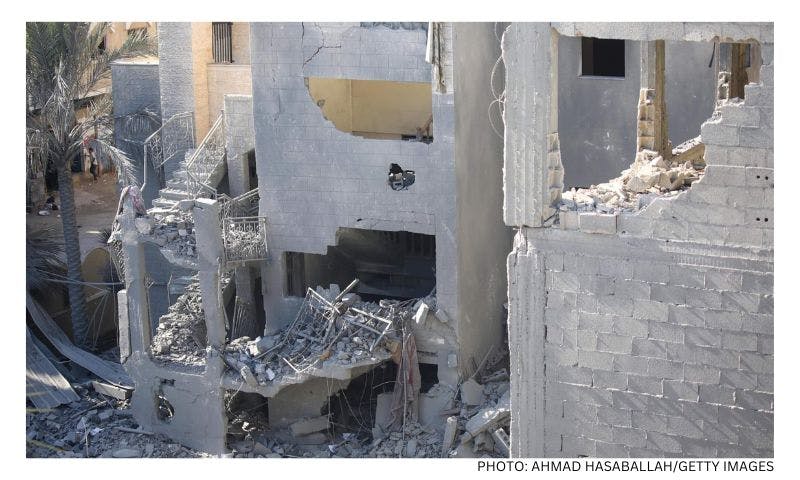Published: 23 April 2020
Last updated: 4 March 2024
EVERYONE IS TALKING ABOUT "Exit Strategy" these days. When, how and why can we exit this lock-down and go back to normal life? The Israeli National Security Council, part of the prime minister's office, has established a committee to plan our exit strategy. Made up of 23 men, many of whom are retired high-ranking army officers, the committee is focused on marching outwards and onwards. They have a plan to save the economy.
I don't want to march outwards and onwards back to normal life and save “the economy”. Of course, I want to get out of lockdown, but before we charge forward, I want to stand still for another moment and think about what "normal" is supposed to mean.
Lurking malevolently somewhere in our space, the coronavirus is shining a very bright light on all of the structural fault lines and social fissures in Israeli society. Like the virus, the light is harsh and unforgiving. Yet even in the midst of this horrible crisis, that light can show us the exit to a better, more just society.
Our medical, educational, economic and social welfare systems weren't healthy before the virus. Now we have the opportunity to treat them, providing not only symptomatic relief but the deep rehabilitation that they need. We have all been cheering our medical workers, and rightly so. We stand on our porches to applaud their professionalism, compassion and dedication. In the face of overwhelming challenges, they are making extraordinary sacrifices to keep us healthy.
The challenges did not have to be so overwhelming, and these men and women should not have to make such extraordinary sacrifices. The virus has hit at a debilitated system already suffering from inadequate funding, lack of investment, poor management, and an incompetent health minister who has been appointed and reappointed as part of political manoeuvring.
Months before the virus broke out, experts were warning that the medical system was already operating at over 120% capacity and would be incapable of handling a major health crisis.
[gallery columns="1" size="large" ids="35091"]
The efforts and sacrifices made by the medical staffs, from doctors and nurses to para-professionals to janitors and sanitation crews, have kept the system from freefall. But no public system should be predicated on the heroism of its employees.
“What exactly has the Health Ministry been doing all these years if not preparing for something like this?” a senior health ministry official asked rhetorically in an interview with the Walla news site.
With schools closed, dedicated teachers are conducting classes on Zoom and smart phones. But they know that this distance learning will increase educational and social gaps and that they will face even worse problems when they return to their classrooms.
Months ago, the Program for International Student Assessment (PISA), which tests students’ problem-solving skills, revealed that the gap between Israeli Jewish and Israeli Arab students, already one of the largest in the world, is growing. On top of that, the digital divide between students who have internet, and parents who can help them, and those that don't is growing, too.
In frequent televised appearances, broadcast in prime time, Prime Minister Benjamin Netanyahu has incessantly told the public to stay home, because our homes are the safest place to be.
But homes aren’t safe for everyone. The combination of being forced to stay at home, financial pressures, loss of structure to the day, and being home with children can lead to sexual and physical abuse of women in families suffering from pre-existing conditions of uncontrolled violence and toxic masculinity.
All of Israel's women's organisations and abuse hotlines are reporting a spike in calls. But there is little they can offer. Israeli shelters for women suffering from abuse by intimates operate at full capacity at the best of times; now, there is simply nowhere for these women to go.
The urban studies theorist Richard Florida has identified two characteristics of jobs that put people at risk for COVID-19: the degree to which workers interact directly with the public, and jobs that require high levels of very close physical proximity to others.
[gallery columns="1" size="large" ids="35092"]
Most of these workers are women. It's really nice to be able to make that quick trip to the supermarket, even if we have to stand in long lines at two-metre distances. But that "check out girl," as women cashiers are too-often called, is probably working at minimum wage with inadequate protection from contagion. And she is probably still thankful that she has a job at all.
From the problems I have listed above, and many others I haven't mentioned, it clear that the neo-liberal economy, predicated on the idea of limited state intervention and the free market, is just not working. Dismantling the welfare state, through privatisation of public services, cutting back on safety nets, and letting banks and stock exchanges run wild, has created a good economy for the few – but has led to social inequality and poverty for the many.
During this time of lockdown, we've all had an opportunity to rethink our values and reconsider what really matters to us. We've come to new understandings about the importance of community, even if our communities are currently held together by Zoom and smartphones. As individuals, we've made commitments to social responsibility, including our agreement to self-quarantine for the greater good.
We've been witness to amazing acts of kindness, compassion, and respect.
These values can be translated into the public sector and lead to different economic models, to create a society that respects the rights of women and minorities and supports a fairer distribution of resources. It's already happening in different places throughout the world.
Spain is nationalizing its private hospitals. California is leasing hotels to provide shelter for the homeless. France is paying for hotel rooms for victims of domestic violence and is opening pop-up counselling centres in stores so that women can get help when they are out getting groceries; the French government is also providing one million euros to civil society organisations to help them respond to increased demands for services.
I'm not calling for revolution, even though I don't think we will see any of these changes here in the near future. Netanyahu and his government are too entrenched in crass politics and corruption to provide hope and social vision. Until we have better leadership, dedicated civil society organisations will continue to maintain these values alive.
Science will find a way – hopefully, a vaccine - along with better prevention and better prevention, to heal us from COVID-19. It's up to us to heal our society.
Photo: Holocaust survivor Miriam Linial, centre left, wears a mask while the two-minute-long siren sounds in the northern Israeli city of Haifa, Israel, April 21, 2020 (AP/Ariel Schalit)




